“You have to do the right thing in life, but don’t look for any rewards.”
Major Hugh Thompson Jr., United States Army (retired)
You should know about Hugh Thompson. Every American should. He was a true hero, who paid a very high price.
Sơn Mỹ, Vietnam.
There was a gentle rain falling with dark clouds moving across the sky. There were puddles on the sidewalk where the elderly Vietnamese were sitting surrounded by coconuts, mangoes, papaya and bamboo. A small charcoal grill sat on the ground, cooking slivers of chicken attached to thin bamboo strips. The women smiled gently as we passed looking up from underneath the broad brims of their nón lá (leaf) hats. We turned right, and headed down a dirt road flanked by a long concrete wall and vegetation on the right. Along the left were simple homes. They were made from concrete and fronted by a courtyard and separated from the road by a gate. Next to the simple houses were small corrals made from wood and bamboo lashed together that held a couple of cows that mellowly and softly mooed. Each house had a small vegetable garden to its right filled with a tangle of fruit bearing vines and bushes.
The dirt road opened up past the houses and continued past rice fields that were tended by local farmers and their harnessed water buffaloes.
I felt very far from America. I also felt deep shame as an American. Soon, I would be made to feel welcome, and then I would feel a grace that I have never experienced before.
I had arrived in Sơn Mỹ early after having set off from the seaside town of Hội An before the day’s first light. Today is the eve of the 55th anniversary of one of the most shameful days in American history, and certainly the most shameful day in the history of the United States Army.
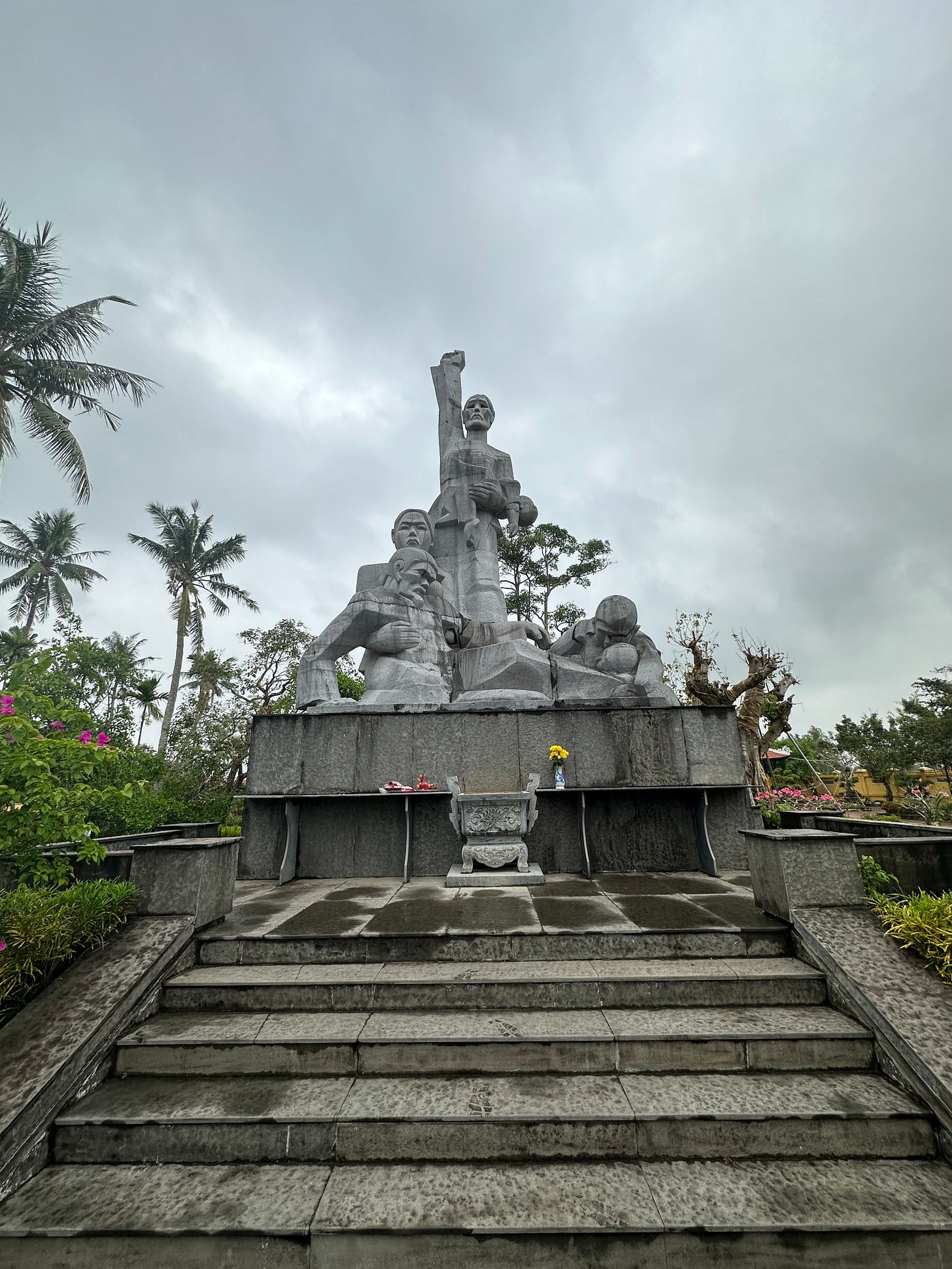
I wanted to arrive proximate to the hour when the helicopters landed carrying the American soldiers of Company C, 1st Battalion, 20th Regiment and Company B, 4th Battalion, 3rd Infantry Regiment, 11th Brigade, 23rd American Infantry division. The murderers and war criminals touched down at 6 am and began their rampage.
The American soldiers raped scores of women from elderly grandmothers to young girls. Their screams were muted because many had their tongues cut out by American bayonets and knives.
The soldiers bayoneted pregnant women and babies. They scalped the living and dead. They herded 107 defenseless civilians into a ditch and executed them at point blank range with automatic weapons. They did not discriminate. They killed every human they could find from babies to the elderly.
This place of murder and mayhem is best known by its American name.
We called it My Lai. It was the place where 504 defenseless, unarmed civilians were savaged by American forces, who acted no differently than SS Einsatzgruppen killers in Eastern Europe murdering Jews.
Hugh Thompson Jr. was flying above Mỹ Lai in his helicopter gunship and was flabbergasted by what he was seeing below. He saw Captain Ernest Medina “blow away” an unarmed woman with a round to the head. He saw 107 dead Vietnamese civilians lying in a ditch, and he saw a large group of Vietnamese fleeing for their lives being pursued by Lt. William Calley and the murderers under his command. Before I tell you what he did, let me introduce you to Hugh Thompson Jr. There are few interviews I have ever seen that capture brokenness, sadness, and the cost of integrity and honor more poignantly. I strongly encourage you to watch this BBC interview with Hugh Thompson Jr.
Hugh Thompson Jr. landed his helicopter between the American criminals and the fleeing Vietnamese and he ordered two members of his crew, Glenn Andreotta and Lawrence Colburn, to aim their machine guns at the American forces if they attempted to kill the fleeing civilians. He was prepared to gun down the killers to save the Vietnamese. He ended the massacre, and loaded the survivors onto his helicopter and saved them. He was ostracized, shunned and threatened with jail. The massacre was kept secret for more than 18 months.
He was an American moral giant.
The first survivor I met was a woman who was 13 years old at the time. She was lucky. Her chores required her to tend the family cow, which was miles from the hamlet because that is where the food was. When she returned later in the day, nearly everyone she had ever known was dead. She lost a sister and a brother.
Đô Tân Thành was 14 years old on the day that the Americans came. He was severely wounded after being butchered by the war criminals. He lost his arm, leg and right eye. Yet, he was happy to see us. His smile was radiant as was that of his wife. They invited my Canadian wife and I into the courtyard and invited us to sit on a simple chair at a simple plastic table. Their granddaughter hurried off and returned with freshly sliced coconut and four glasses, and filled them with coconut water. Sau Thành (his nickname) went inside and came back with two pictures that were set next to each other on a mantel. One was of his mother, who survived that day, and the other was of an American veteran, who would return each year with other Americans and pay his respects to the survivors, and specifically his mother. When the American veteran died during Covid his widow sent his picture to Sau Thành, who placed it next to that of his mother. He said the veterans treated his mother like theirs, and so they were his brothers.
The magnanimity, grace and spirit of the community is better described by Hugh Thompson Jr. at the 21:00 mark of the above interview. Please listen to what he says. What he says is staggering, and I know it to be true.
The reason that Mỹ Lai became known to the world was because of the heroism of another American soldier named Ron Ridenhour, who served as a door gunner on an American observation helicopter. He saw the aftermath of Mỹ Lai, and it filled him with rage. He became a whistleblower and wrote scores of letters until the US Army finally investigated the incident.
The investigation was a farce and a whitewash. In the end, 26 officers and soldiers were charged. Only one was convicted. He spent three days in jail and a few months under house arrest, where he was allowed conjugal visits. That man was Lt. William Calley. The 26 year old had a dash of red hair and was known as “Rusty.”
Back home in America, Rusty became a hero. According to the polls, 75 - 80 per cent of Americans supported the war criminal and murderer.
Edgar Whitcomb, Governor of Indiana, ordered flags to be flown at half mast, not to mourn the murdered, but to mourn the incarceration of the murderer.
Governor Jimmy Carter of Georgia, a fierce supporter of the Vietnam War, asked every Georgian to show their support for “Rusty” by turning their headlights on during daytime until he was released from prison, which Richard Nixon made possible with his commutation of Calley’s life sentence.
Major Colin Powell, US Army major in 1968, was one of the investigating officers of the massacre. The findings of the great American statesman remain chilling today:
There may be isolated cases of mistreatment of civilians and POWs [by US military personnel] but this by no means reflects the general attitude throughout the division… In direct refutation of this [Tom Glen’s] portrayal is the fact that relations between American soldiers and the Vietnamese people are excellent.
Thirty years after Mỹ Lai, Hugh Thompson Jr., and the two other members of his crew, Andreotta and Colburn, were honored by the US Army with the Soldier’s Medal. The army preferred that the ceremony take place in secret. Thompson Jr. insisted it take place in public. Bravery and courage should never be hidden behind a veil of cowardice.
It is important to understand that not every American became a murderer who landed in Mỹ Lai, though they are all moral cowards.
According to Hugh Thompson Jr., there were likely 13 - 18 Americans who slaughtered, raped, maimed and scalped. The overwhelming majority stood passively at the perimeter. They did not participate, nor did they act to stop it. Only one man and his crew acted to stop it. There are deep lessons from this tragedy that should never be forgotten, and are deeply relevant towards this age of rancid political cowardice.
Lt. William Calley has lived a long life. He is 86 years old. He should never be forgiven in America for what he did. There is a place, however, that is waiting to forgive him. I find that remarkable. I told my new friend Sau Thành that he would never come because he is a coward, as well as a murderer. My religious faith instructs that he will suffer in the afterlife. Sau Thành believes he will suffer in the next life. A few years back, Calley apologized at a rotary lunch and expressed his regret. It wasn’t good enough — and it was in the wrong country.
During the fraught decades ahead, Vietnam will become an essential security partner in the multinational coalition of sovereign nations that rejects the notion of Chinese hegemony across Asia and dominance of the mineral-rich South China Sea.
It is my deepest hope that I will live to see an American president come to Mỹ Lai, and apologize. These events took place before my birth, but they are unfinished business for our great nation that must face its hours of shame with as much passion that we celebrate our glory.
The people of Sơn Mỹ live a simple life, but they were happy in a way that I can’t explain. They live next to a monument and shrine to suffering, yet they are keen to forgive. “Let bygones be bygones, though our hearts will never forget,” said Sau Thành.
I have been to Auschwitz and a dozen other Nazi camps. I have been to the African American History Museum, the Civil Rights Museum, Southern slave plantations and many other places around the world where atrocities of unfathomable dimensions have occurred.
I will never forget my day in Mỹ Lai, and no American has the right to be unaware of the sickening anniversary upon us.
Let us pray for the dead.





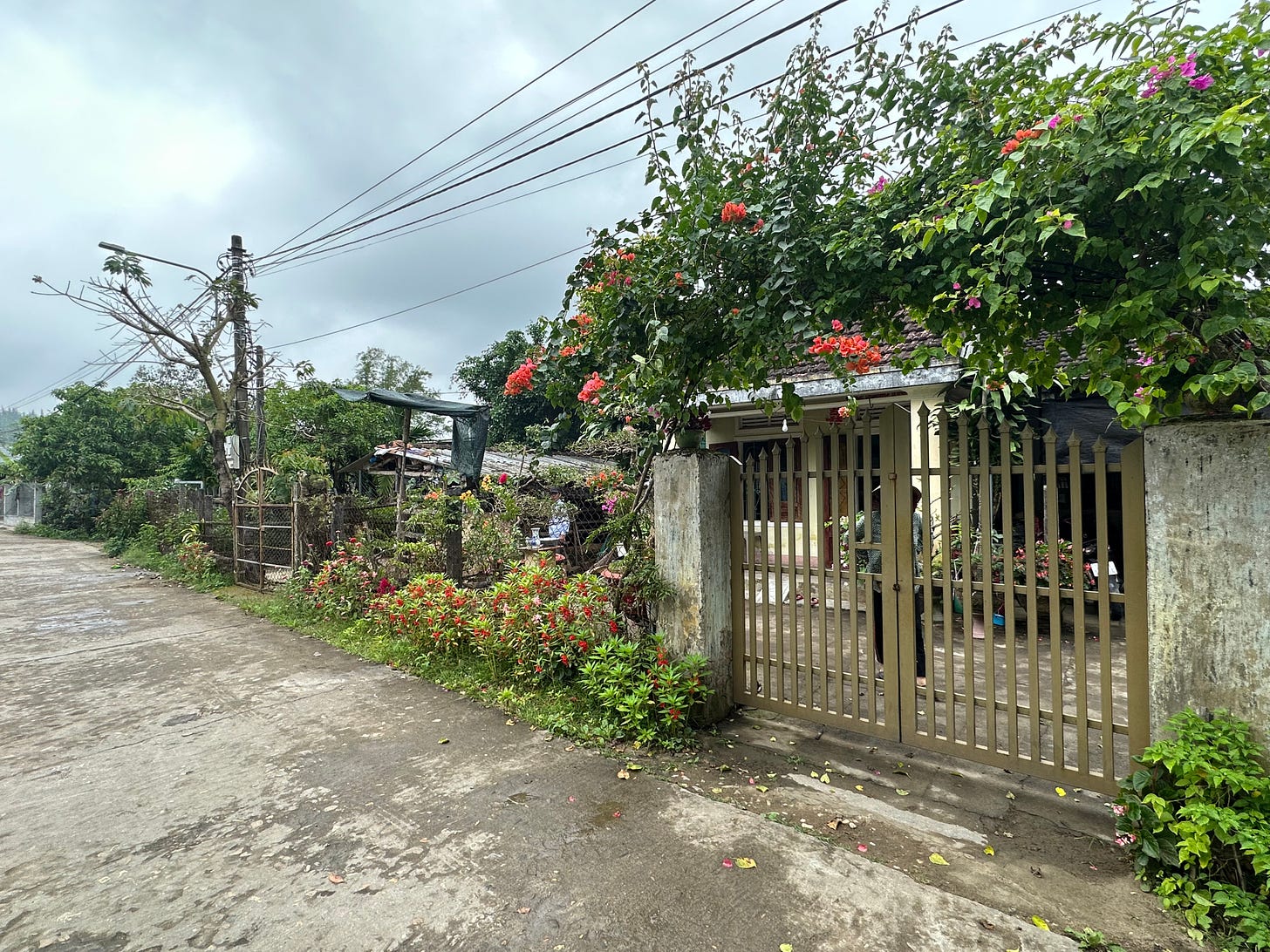
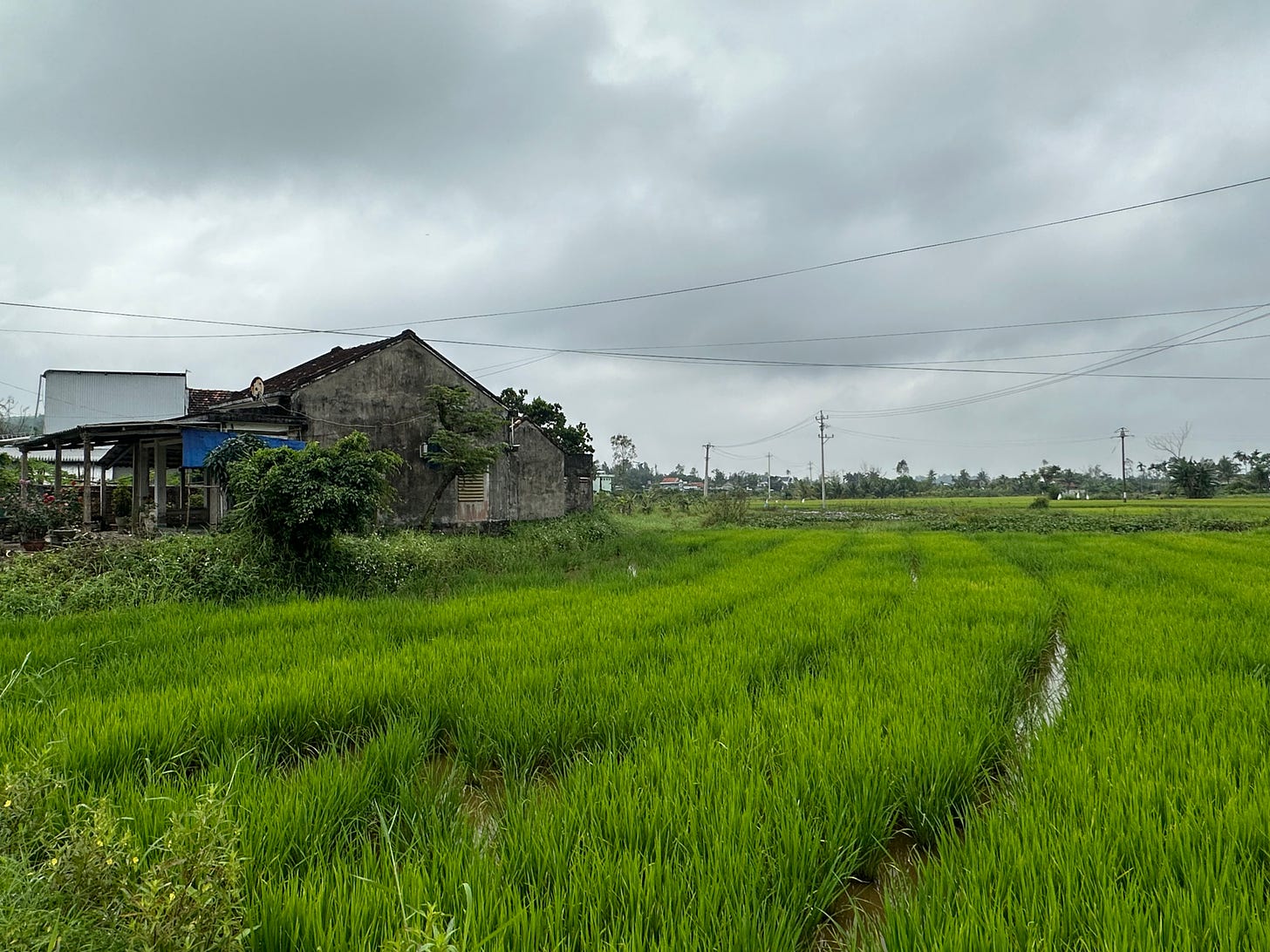
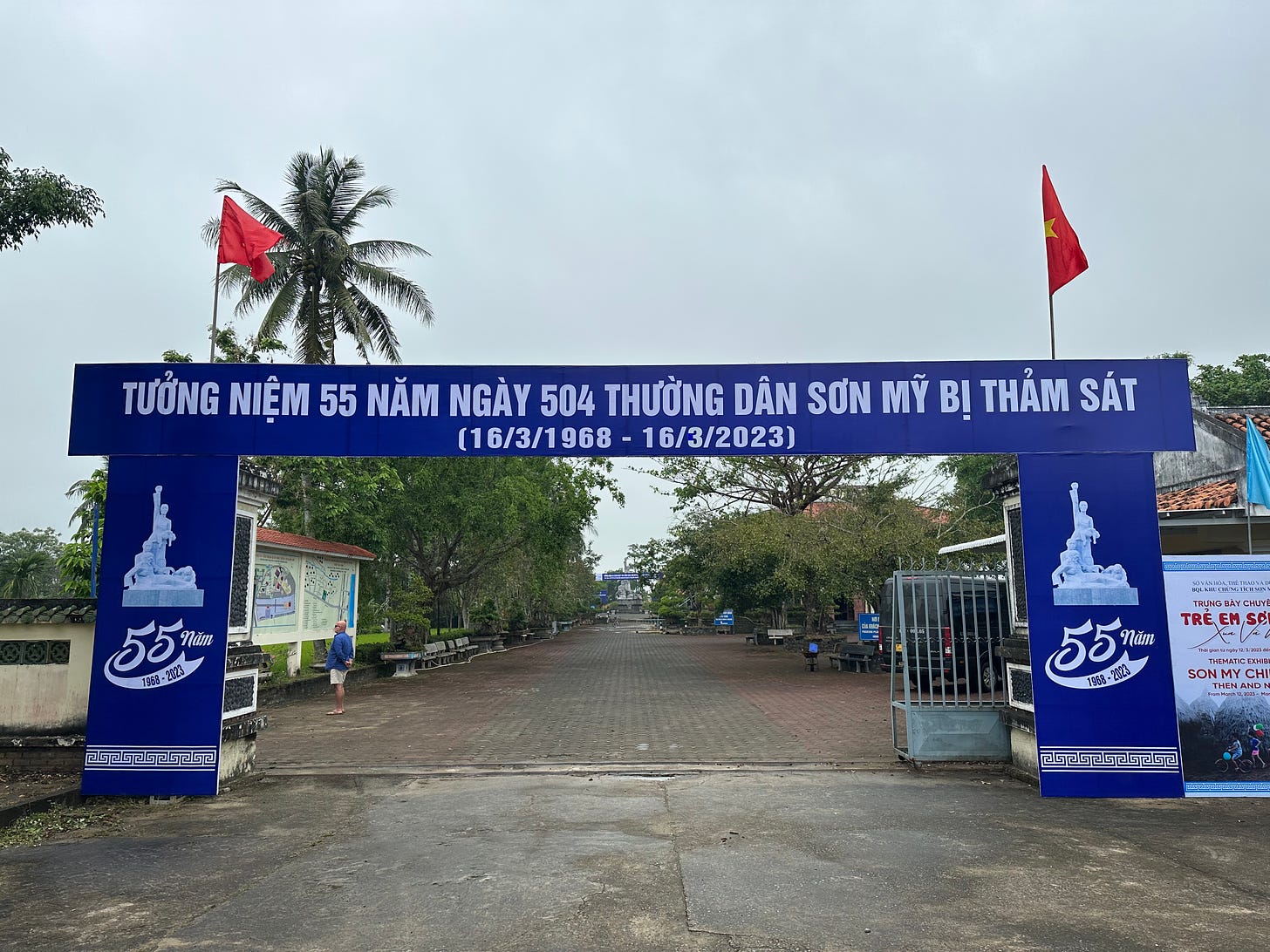

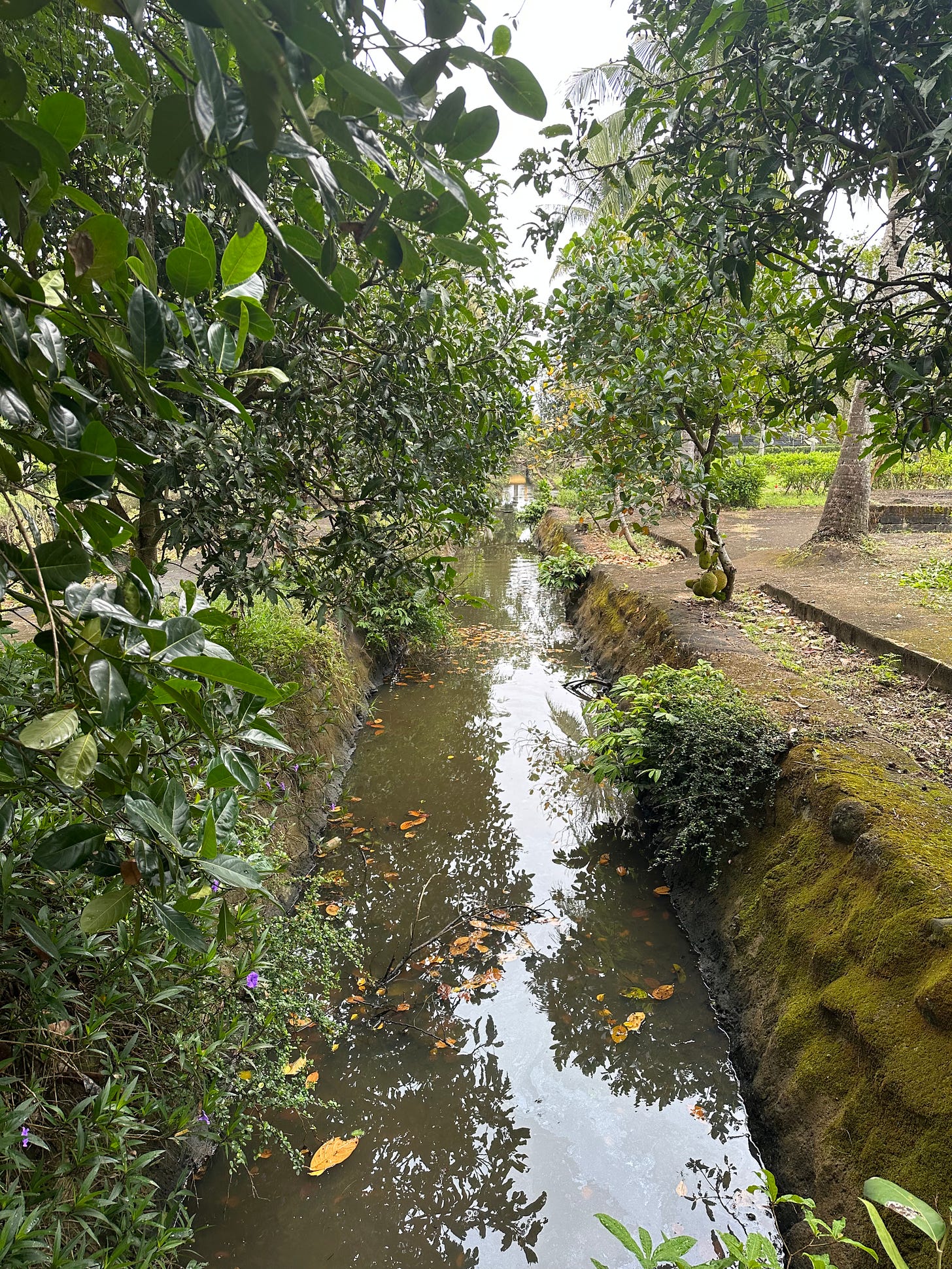
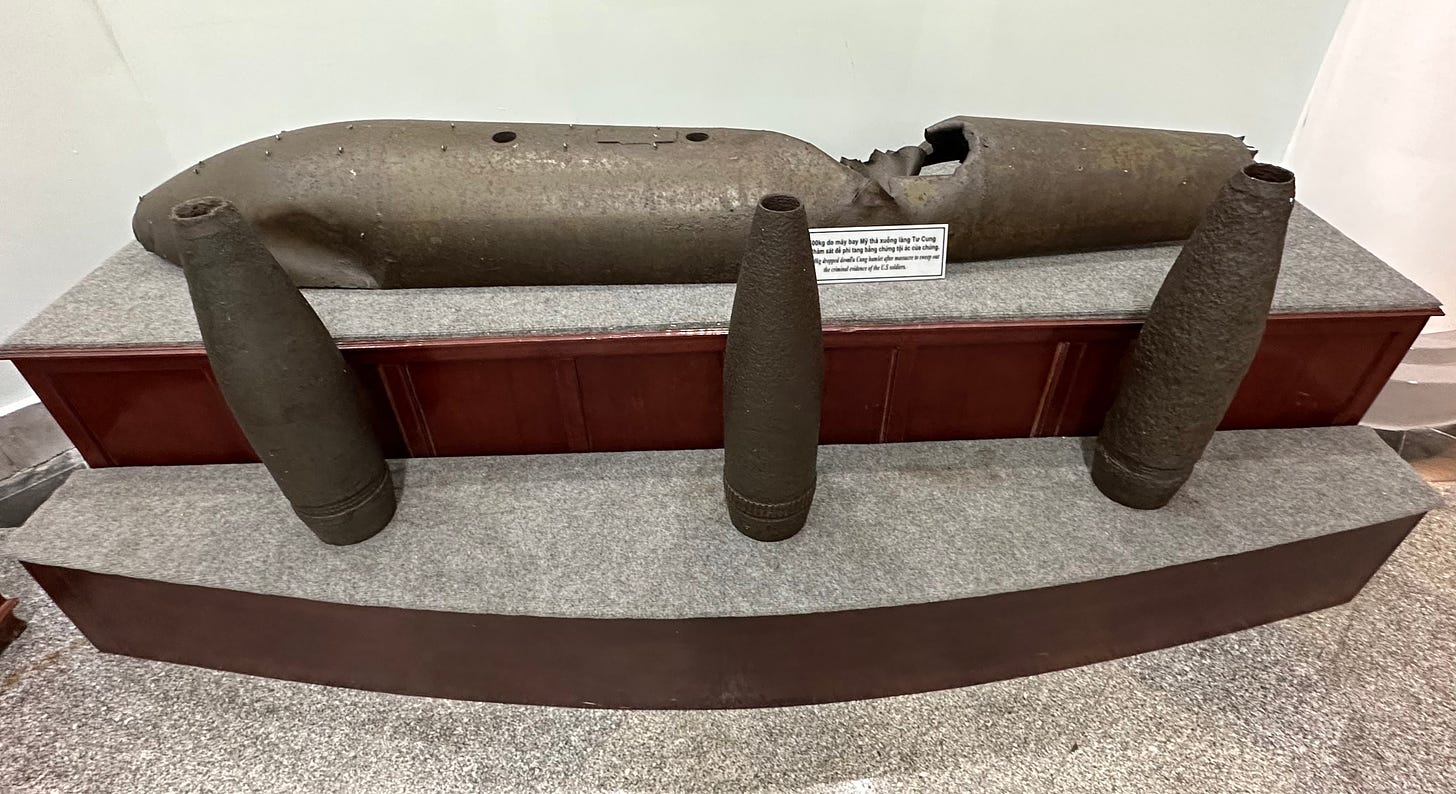
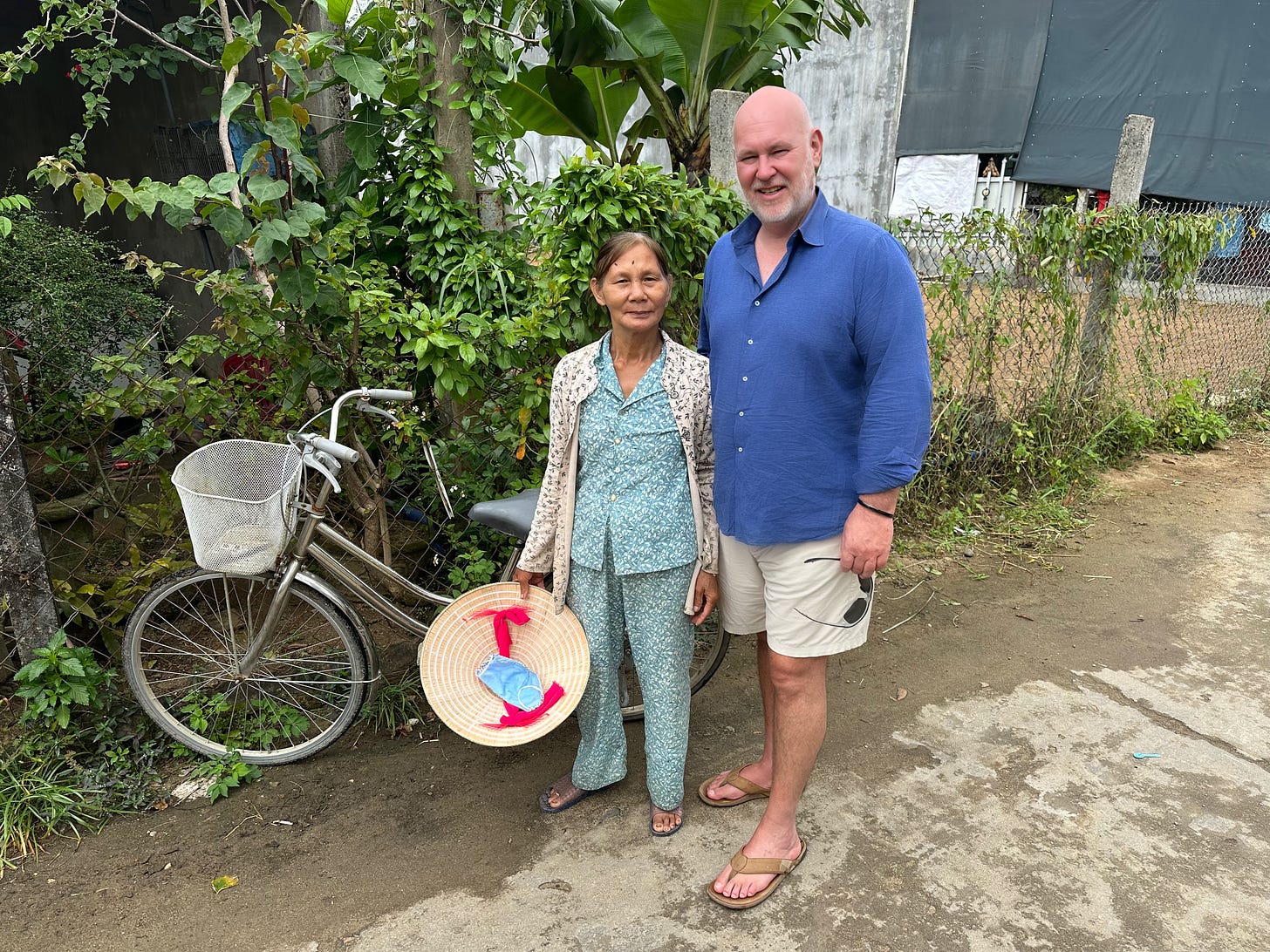

I was a soon-to-graduate high school senior when this occurred. Needless to say, my belief in our country’s values were shaken.
I followed what news I could find and vowed I would never be a part of such inhumane behavior. This was one of the things that led me a few years later to join the Peace Corps to try to help people overseas and to try to learn about other cultures.
Thank you for remembering this and attempting to be the conscience of our country (not just this day, but every day that you write about what we were, and what we could be).
Thank you Steve, that was a sobering way to start my day, not that I needed sobering up. I fought in VN in 1970 and can state unequivocally that I never took part in anything that could be construed as a war crime, not because I was a saint because I wasn’t, probably the morality of my education acted as a guide, not that I knew it at the time. The passions of warfare can cloud moral vision, but something’s are fundamentally wrong and clouded vision doesn’t obscure that reality. Just as there is no excuse for what the Russians have been doing to the Ukrainians, so too there was no excuse for what took place in My Lai, none. I was in special forces training when this happened and I never heard it mentioned, my instructors were warriors, some of the finest our country has ever produced, among them were men that had earned the Medal of Honor, they were men who valued honor and like me would walk into hell, and did so to protect a brother in arms. What happened in My Lai is a stain on the Army and anyone that abetted it, it was a crucible that sadly proved that our institutions were lacking in moral clarity. Lack of clarity is what has produced the political class we are burdened with today, which is truly frightening.